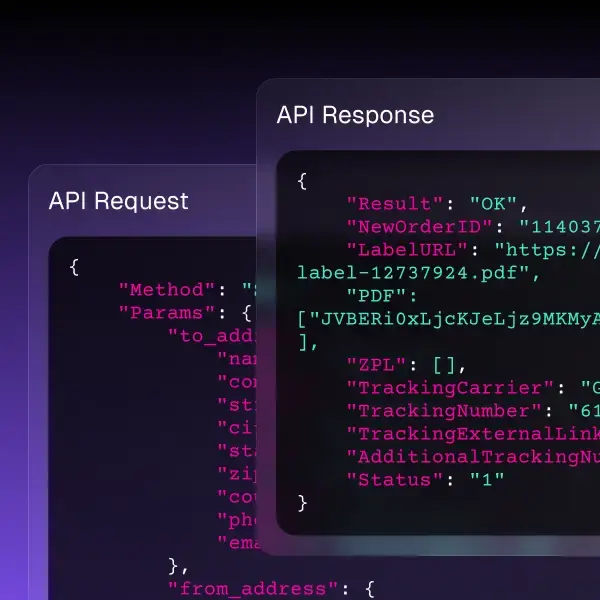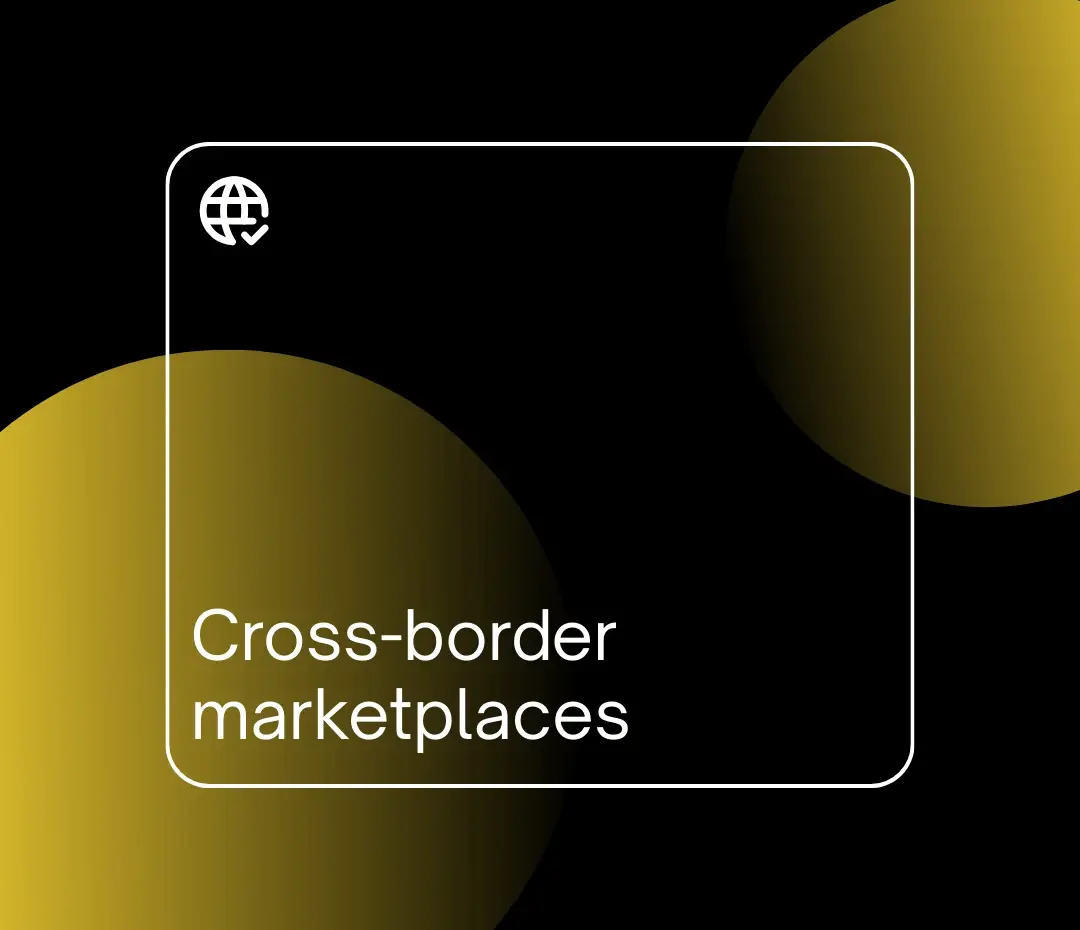Referral marketing for e-commerce: growth through word-of-mouth
.jpg?width=1920&height=1080&name=Marketing%20%20(8).jpg)
Did you know that your own satisfied customers are a powerful marketing asset, sometimes even more than a well-crafted advertising campaign?
Word-of-mouth in ecommerce is relatively inexpensive yet efficient and businesses are starting to understand the power of encouraging happy customers to advocate for their brand by offering them appealing discounts and incentives. Let’s discover more about this trend.
Table of contents
- What is referral marketing?
- Why referral marketing works for e-commerce
- 7 statistics on referral programs
- Setting up a successful referral program
- Referral programmes examples
- Best platforms and software for managing referral programmes
What is referral marketing?
Referral marketing is a strategy that capitalises on word-of-mouth, motivating past customers to naturally recommend a brand’s products to others in exchange of a discount, credit, or gift.
Referral marketing programmes are often called refer-a-friend programs because they leverage the power of genuine connection, fostering trust in a way that traditional marketing can’t. In fact, referral marketing in ecommerce is a valuable asset precisely because it is often more convincing than traditional advertising or OOH advertising.
The informal aspect of it brings greater trust and authenticity, facilitating a more organic customer acquisition process. Moreover, referral marketing is relatively inexpensive, with a higher customer retention rate and Lifetime Value, especially if compared to traditional advertising campaigns.
The impact of word-of-mouth in the digital age
With social media, online reviews, and influencers giving advice on so many topics, for Millennials and Gen Z, two digitally native generations, word-of-mouth resonates more than traditional advertisement claims that they often find too polished and curated. In fact, referrals are a big deal to millennials with 48% saying they’re more influenced by word-of-mouth than by TV ads.
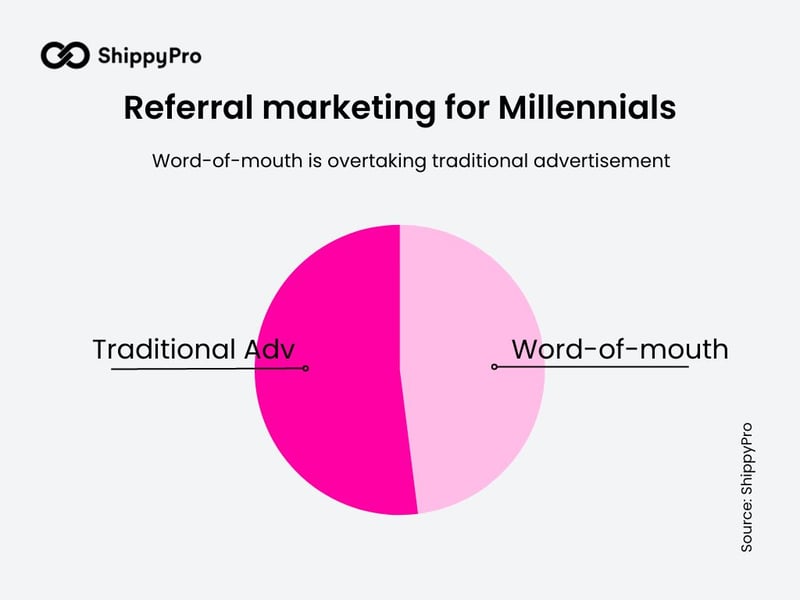
Why? Because recommendations or positive reviews come across as advice given from a friend. In fact, digitally native generations place a high value on authenticity. Unboxing videos or testimonials for example, all offer a raw and unfiltered view of products or services, capturing this candid essence of real-life experiences. Also, online platforms or niche communities are important for them because they allow these younger audiences to dive deeper into their interests, looking for advice from like-minded individuals.
Why referral marketing works for e-commerce
The psychology behind referrals and trust
Since ecommerce operates in the digital realm, it obviously lacks physical interaction with products and the human connection that is created in traditional brick-and-mortar stores.
In fact, when shopping online the trust factor has a huge impact and ecommerce stores usually have to go the extra mile to cultivate that trust. So, in this context, referral marketing is the ideal solution to bridge this gap. How? Primarily, when a recommendation for a product comes from a trusted person, friend or influencer we admire, it enhances credibility through social proof.
There is, in fact, an inherent human tendency to value products that those in our circle vouch for. Furthermore, given that many ecommerce brands thrive on social media platforms like Instagram or Facebook, integrating referral marketing campaigns is just a natural fit.
A natural filter for precise audience targeting
Referral marketing is based on one of human nature's simplest pleasures: sharing good experiences. In fact, word-of-mouth promotion, a cornerstone of referral marketing, offers businesses a valuable and cost-effective solution.
The effectiveness of this strategy lies in its precision, as customers naturally tend to refer friends who they believe will resonate with a certain brand. In this way, not only do they act as ambassadors, but they also effectively filter the audience to those already predisposed to the offerings. This approach saves businesses the time and energy traditionally spent on market targeting.
Easy integration
Among the benefits of referral marketing, we also find easy integration. Since ecommerce stores usually offer discounts, special offers or gift cards, including a referral programme that offers rewards to both the referrer and the referred person is more straightforward than ever. Furthermore, this win-win scenario drives sales and creates more repeat customers than traditional campaigns.
7 statistics showcasing the effectiveness of referral programs
Referral marketing has proved to be a revenue generator for online businesses. In a digitally driven age, individuals tend to trust personal recommendations and user testimonials more than traditional advertisements or brand-centric content. Let’s just take a look at some interesting stats!
- 92% of consumers trust referrals from people they know more than other forms of advertising. Only 36% trust online video ads. (Nielson)
- 88% of Americans say they would like a reward or incentive for sharing products on social media. (Ambassador)
- Specific brands are the topic of conversations 90 times per week. (HubSpot)
- 86% of B2B buyers say word-of-mouth is the most influential factor in making purchase decisions. (Blanc & Otus)
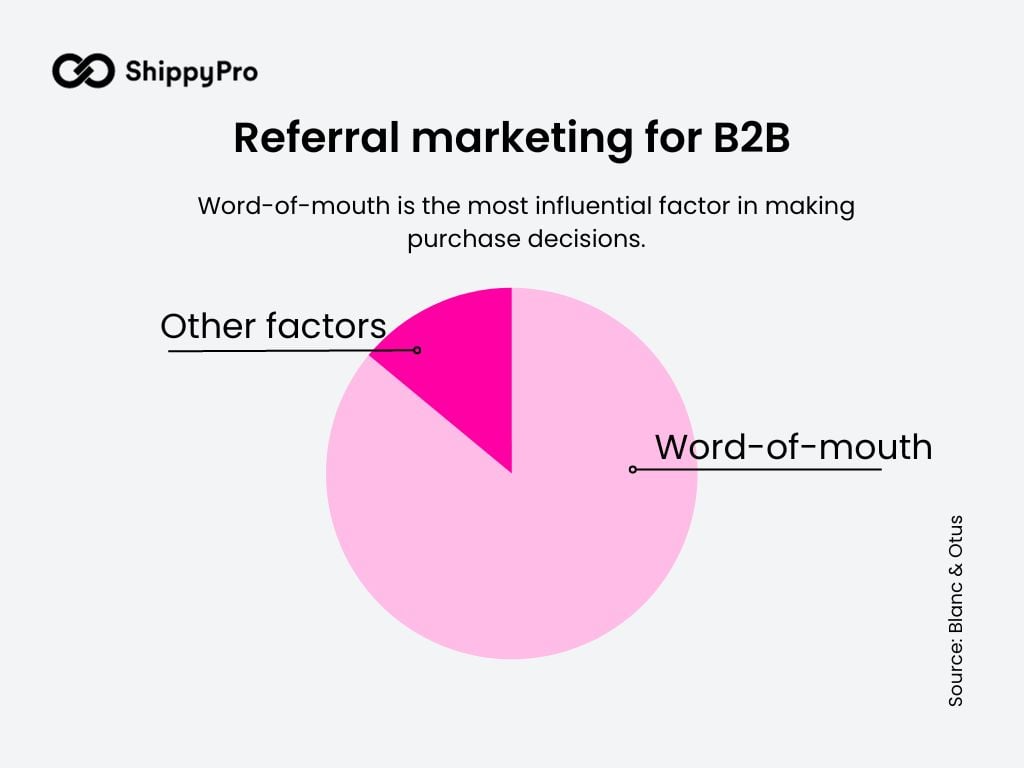
- 83% of customers are willing to refer products and services. (ReferralCandy)
- 91% of millennials would consider a purchase if recommendation comes from a friend (Annex Cloud)
- B2B companies with referral programs are 2 times more likely to have effective sales efforts than those without (Statista)
Setting up a successful referral program
Determine the right incentives for both referrers and referees
The most important aspect when planning a referral programme is choosing the right incentive. For example, 91.2% of referral programs are double-sided (SaaSquatch), meaning that companies reward both the referred person and the referrer. Furthermore, 50% of referral reward programs offer money credit to their promoters, usually 10 $. Gift cards rank at the second most common reward in referral programmes with 17.6%, followed by discounts (9.8%), subscription time (5.9%), cash (5.9%), and points (5.9%). Remember to always check what your competitors are up to. Find out what rewards they offer and try to surpass them.
Streamline the referral process for ease and clarity
Providing referrers with effective referral marketing tools is equally important. Design must be simple, with a user-friendly, intuitive interface. The steps to refer someone should be hassle-free and straightforward. Also, make sure to formulate clear Call-To-Actions, so that people know what actions to take. Also, offering various sharing methods, such as a unique tracking link, email or social media is very handy to allow users to share the offer with whoever they like when they like, and receive credit easily for their successful referrals.
Referral programmes examples
Successful referral campaigns have two things in common: clarity and simplicity. Let’s take a look at brands that nailed the strategy, incentivizing customer referral with a few interesting tactics.
Revolut
Revolut, a London-based fintech, boosts their growth while reducing acquisition costs, by constantly running very interesting referral programmes.
Referrers and referred can earn different cash bonuses, such as €45, £50, or US$10, by inviting friends who order a physical card and make 3 transactions. This strategy pays off, as the company is growing their customer base exponentially.
Uber

Img source: Voucherify
Uber referrals have definitely been a success! Upon account activation, each user receives a unique referral code and if a new member signs up using the code, both the existing user and the newcomer enjoy a free Uber ride or discount. Additionally, Uber encourages its drivers to invite new ones through a separate referral programme.
PayPal
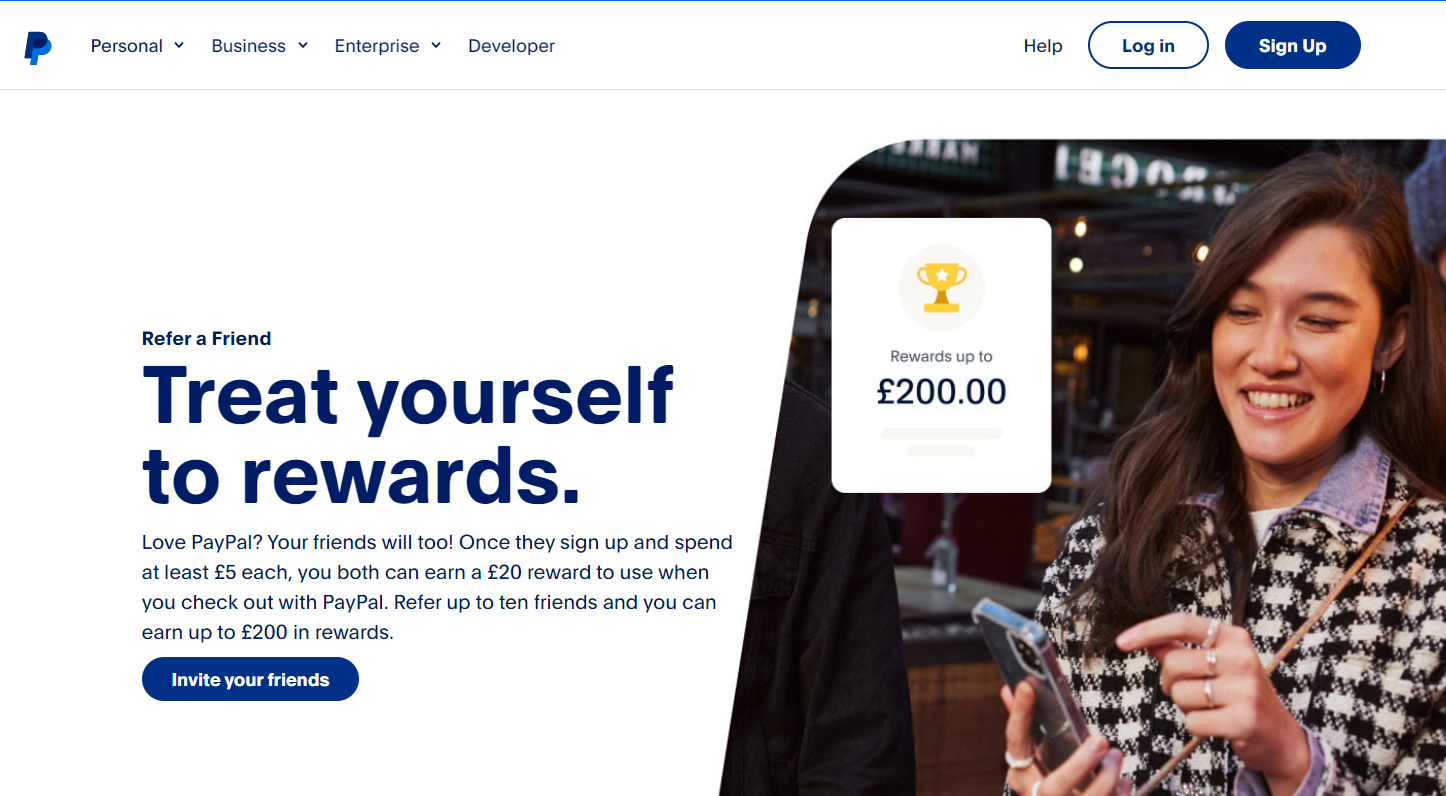
PayPal is one of the pioneers of referral programmes, as it was one of the first to offer rewards for inviting friends. It offers a $10 double-sided reward every time a new referred member signs up.
ASOS
Among the successful ecommerce referral strategies, we find Asos’ solid referral programme, with a simple layout and user-friendly, intuitive build-up so that people are more likely to sign up. Their offer has a straightforward CTA “Give 20% off, get 20% off on all items”.
Leveraging technology and tools for referral marketing
When setting up referral programs into your brand’s marketing strategies, it is important to maintain a consistent brand image and avoid spammy tactics. Technology helps to overcome these common challenges in referral marketing and also helps in streamlining operations, by automating processes and tracking performance. If brands leverage the right tools and platforms, they can make sure their referrals are more genuine, while maintaining brand consistency. Let’s look at some platforms!
Best platforms and software for managing referral programmes
Shopify
Setting up a referral program on a Shopify site is extremely easy and straightforward.
There are different Shopify apps available for starting referral programs, some are premium options, like ReferralCandy, but there are many free ones too.
Referral Rock
Referral Rock is an expensive option but has different advanced and useful features. Referral programmes can be customized so as to align them with every brand’s specific needs. Customers can share by URL, email, or social media, and retailers can track their conversions for more accurate metrics. It allows segmentation of shares from new members versus existing ones and measures the impression rate. Referral Rock also handles reward distribution, like gift cards, coupons, or prepaid visa cards.
Genius Referrals
Genius Referrals offers different referral solutions, from free to premium, as well as customizable templates, making it a very versatile platform for referral marketing needs. It works with WordPress, Shopify, BigCommerce, PrestaShop, or any website CMS. It allows customers to refer others through email, social media, or custom URL. Genius Referrals manages all the tracking and provides tools for taking care of payout requests and rewards.
Ambassador
Ambassador is an all-in-one referral program software, providing retailers with unique links, task-based campaigns, or QR Codes to facilitate sharing, both online and offline. These can be added to a brand’s marketing materials. It also allows businesses to control their messages by enabling easy share of multimedia content. The focus of this software lies in personalization, allowing brands to align their marketing efforts to their image, by equipping them with customizable landing pages. Also, brands can monitor their performance easily using the advanced tools on the platform.
Conclusion
In today’s digital age, where consumers are constantly bombarded with advertisements and promotions, the genuine voice of a satisfied customer is even more precious. Businesses have realized this and have integrated referral marketing programmes to capitalize on the power of word-of-mouth. Referral marketing harnesses authenticity, and especially for eCommerce businesses that strive to establish trust, integrating referral marketing programmes has helped them to grow their sales and community significantly. As competition soars, word-of-mouth remains a timeless and invaluable tool for growth.
Passionate freelance copywriter, with a niche in ecommerce and logistics. When collaborating with ShippyPro, she loves writing about trends, marketing and communication strategies to help brands gain an edge in an ever-evolving digital landscape.



